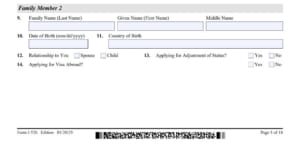While the consular officer has the authority to ask a very broad range of questions, here is a list of 20 possible questions that may come up.
- Why are you traveling to the U.S.?
- Do you have any relatives in the U.S.?
 Have you ever applied for a U.S. visa before?
Have you ever applied for a U.S. visa before?- How long do you intend on staying in the U.S. for?
- What is your current job?
- How long have you been in your current job for?
- Do you have any immediate relatives in the U.S.?
- Do you have any children?
- How much is your annual income?
- What are your travel dates?
- Have you booked your tickets?
- What is the guarantee that you will depart the United States and not overstay?
- Are there any specific things that you plan on doing while in the U.S.?
- Who is paying for your trip?
- Can you provide the name, address and telephone number of your contact inside the U.S.?
- Do you have any plans of eventually living and working permanently in the U.S.?
- How will be you getting around the U.S.?
- After your trip, do you plan on traveling to other countries or straight home?
- Have you ever been refused a visa to any country?
- Do you have medical insurance in the event you get sick while in the U.S.?
ENTERLINE & PARTNERS CONSULTING
Ad: 3F, IBC building, 1A Cong Truong Me Linh Str, District 1, HCMC.
Tel: 0933 301 488
Email: info@enterlinepartners.com
Website: http://enterlinepartners.com




